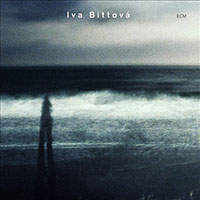Home » Jazz Articles » Album Review » Iva Bittova: Iva Bittova
Iva Bittova: Iva Bittova
Iva Bittovà is clearly one of those musicians. Her first label appearance, as featured vocalist, on Vladimír Godár's decidedly classical Mater (2008), represented but one of her many talents. Bittovà is also a fine violinist, but on her simply titled leader debut, Iva Bittovà, she demonstrates not just her capable skills as a singer and violinist; on some of the equally austerely titled tracks—numbered simply "Fragment I" to "Fragment XII"—she also adds kalimba to the mix. A recital of stark but warm yet haunting clarity, it's impossible to categorize. Is it folk music? There's little doubt that the music of her native northern Moravia (at the time of her birth, still part of Czechoslovakia) imbues the proceedings. Is it classical music? It's equally clear that her musical family and academic training in drama, music and ballet prepared her for a life in that environs. Is it jazz? Perhaps not, but improvisation is clearly a part of her bigger picture, with additional cred from Moravian Gems (CubeMeteier), her 2007 date with bassist George Mraz. Perhaps Bittovà's music is something more easily described by what it's not than what it is.
Instead, Iva Bittovà works from a number of reference points, blending them anew. There are hints of Meredith Monk in the way she sings over the kalimba-driven "Fragment I," her vocalizing even bearing trace elements of scat, except there are no gymnastics going on, only an arcane lyricism that hints at surprise without ever being so blatantly obvious. "Fragment II" is even more abstruse; driven by a simple violin chord pattern, Bittovà's unusual choices and unpredictable stops and starts give the piece its own element of the unexpected. On "Fragment III," she opens with an idiosyncratic melody sung in unison with her violin before the miniature—all but two of Iva Bittovà's twelve tracks are under the four minute mark—opens up into something more folkloric, but in the way that Béla Bartók's music is also based on the folk music of his native Hungary. And if it seems that the piece is more strictly composed, there are brief passages where she might suddenly hold onto a note, repeating it multiple times before moving forward, that suggest otherwise.
It's an overall eccentric yet thoroughly compelling performance that possesses its own dramaturgy, even as it dispels myths of convention. Iva Bittovà is a curious and quirky debut, but one which reaps the continued rewards of repeat plays.
Track Listing
Fragment I; Fragment II; Fragment III; Fragment IV; Fragment V; Fragment VI; Fragment VII; Fragment VIII; Fragment IX; Fragment X; Fragment XI; Fragment XII.
Personnel
Iva Bittova
vocalsIva Bittovà: violin, voice, kalimba.
Album information
Title: Iva Bittova | Year Released: 2013 | Record Label: ECM Records
< Previous
Art Blakey and the Jazz Messengers: M...
Next >
The Magic of 2
Comments
Tags
For the Love of Jazz
 All About Jazz has been a pillar of jazz since 1995, championing it as an art form and, more importantly, supporting the musicians who create it. Our enduring commitment has made "AAJ" one of the most culturally important websites of its kind, read by hundreds of thousands of fans, musicians and industry figures every month.
All About Jazz has been a pillar of jazz since 1995, championing it as an art form and, more importantly, supporting the musicians who create it. Our enduring commitment has made "AAJ" one of the most culturally important websites of its kind, read by hundreds of thousands of fans, musicians and industry figures every month.




















